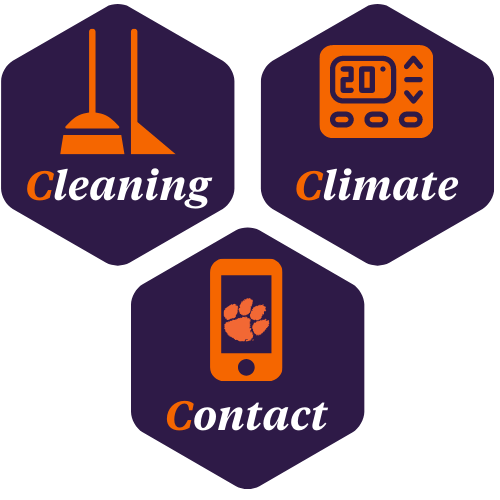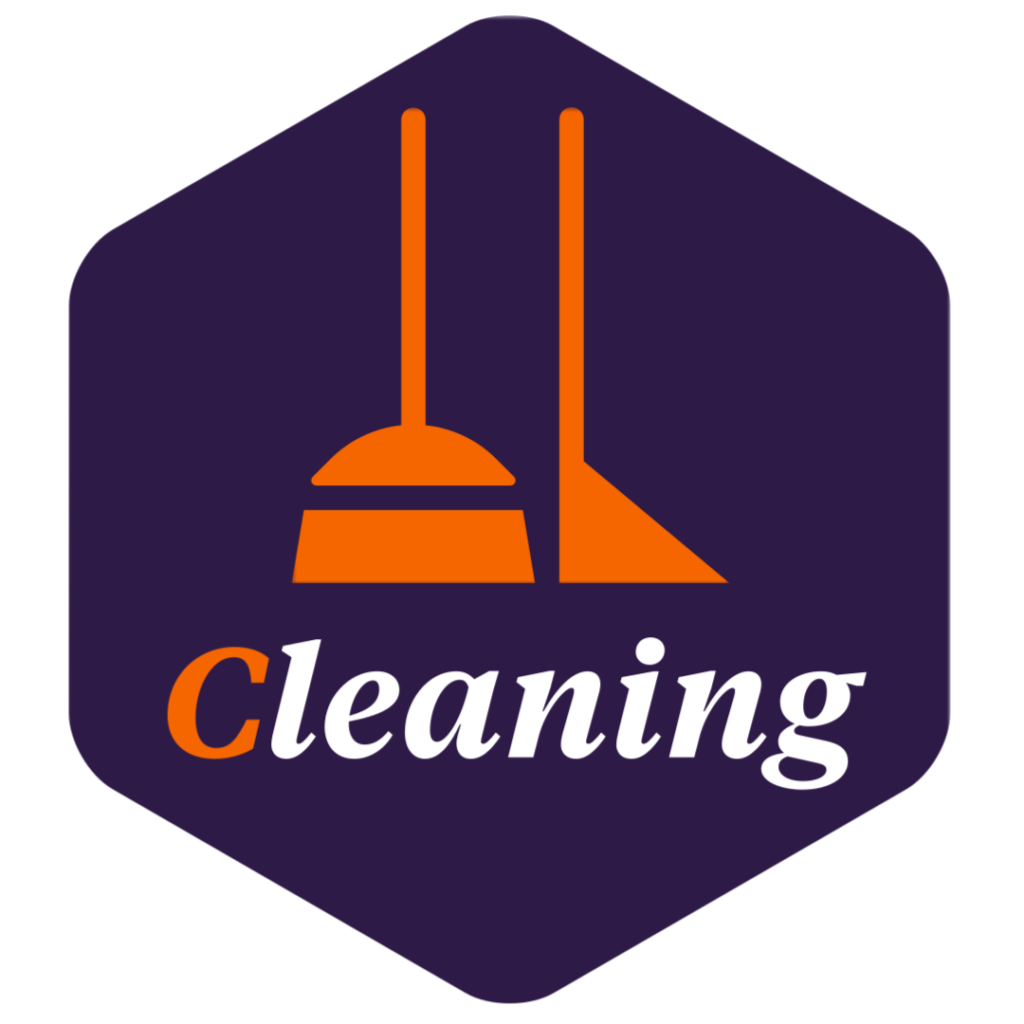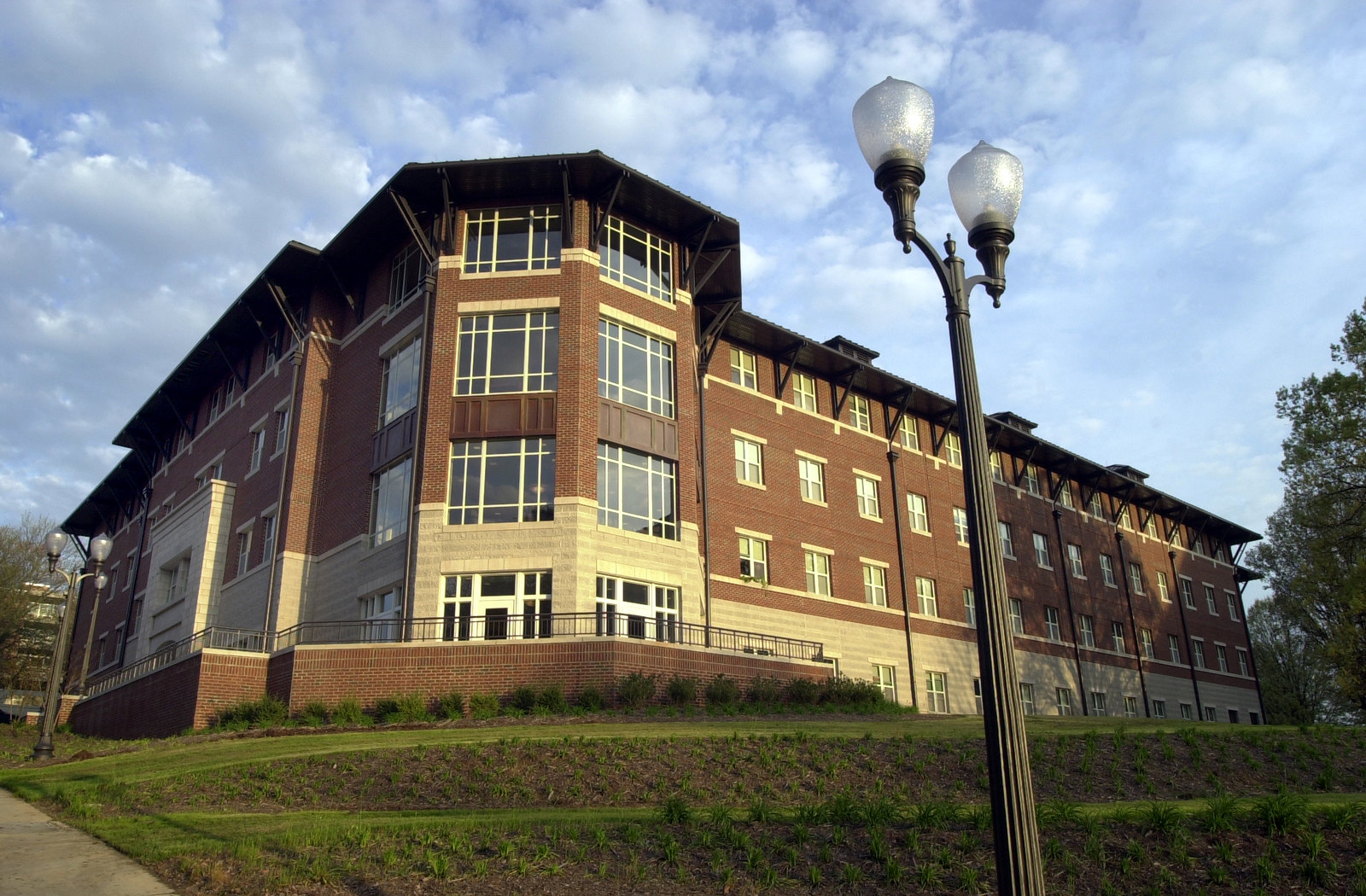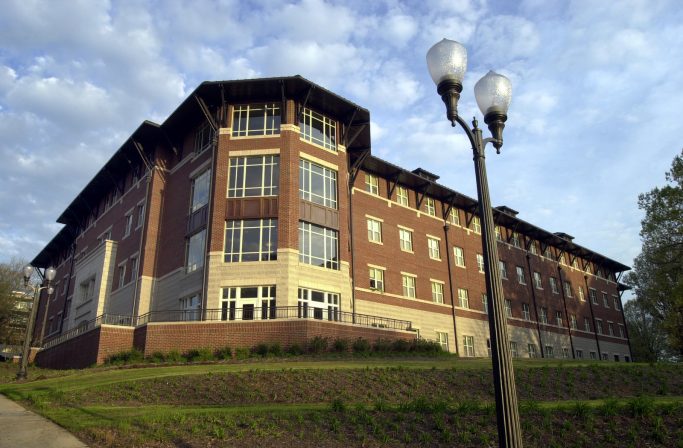
The 3 C’s of Taking Care of Your Space
When you live with Clemson Home, you have a responsibility to maintain your residential spaces. Just like any other home, you need to take certain steps to ensure your living environment remains a comfortable, safe, and clean place to live.

Cleaning
- Cleanliness in your space can assist in preventing mold, pest, and insects.
- Hang up damp or wet items, such as towels, bathmats, or clothing to dry.
- Dust and wipe down your space regularly.
- Do not allow mildew to accumulate in your bath and shower stalls.
- Report any mold or mildew in the community bathrooms to your RA or housing staff.

Climate
- Keep the windows closed when air conditioning is on.
- Use bathroom exhaust fans and bathmats when available.
- Do not tamper with the HVAC unit.
- Keep fan setting on “auto” in rooms with traditional thermostats.

Contact
- Communicate any leaks or water intrusion to Facilities immediately.
How you can maintain your space
- Clean, dust, and vacuum or sweep at least once a week.
- Dispose of garbage promptly and properly.
- Routinely clean your refrigerator and microwave.
- Store food properly
- Spray your space with disinfectant spray.
- Immediately clean up any spills or accidents.
- Report any leaks to Maintenance immediately.
- Keep clutter to a minimum.
- Keep a consistent temperature in your room.
- Do not block air vents/grilles and dust these areas regularly.
- Avoid cardboard storage containers.
Have a current concern?
Emergency Situations
Water intrusion or sewage backflows require immediate attention. Contact maintenance (or your residential on-call number if after hours) to report.
Be clear and provide all available information about the source of the issue, damage, affected areas, etc.
FAQ’s
How should I clean my room?
All residents should be cleaning their space on a regular schedule. Make sure you or your roommate have a broom or dry sweeping mop for solid surface floors and a small vacuum for carpets and rugs. Make a plan with your roommate(s) to clean the room at least once a week and if you’re in a suite or apartment, be sure you’re including the bathroom and common spaces as well.
Mold thrives in wet/humid areas, so you might find it on vents, furniture, or around the windows. Small amounts of mold and mildew can be cleaned by the occupant. Use a wet clean up method – a damp cloth with quaternary ammonium products such as Clorox wipes are recommended to clean areas of concern. You will want to dispose of the Clorox wipes and materials after clean up.
If you have food or liquid spills, make sure you clean it up right away and don’t leave any residue or crumbs. Moisture control, air circulation and good housekeeping practices are necessary to help you avoid unwelcome pests, allergens, mold, and mildew.
How can I avoid allergens?
It is important to keep in mind that many students new to South Carolina will experience seasonal allergy symptoms, even without a prior history of this condition. Having never experienced problems with seasonal allergies, many students may attribute these symptoms to a sinus infection or other issues. To help avoid additional allergy issues be sure you are limiting moisture in your room, dusting vents, furniture, and flat surfaces, and keeping your space clean. Mold produces allergens, but like any other allergen, exposed individuals will respond differently.
What inspection processes occur?
Proactive facility inspections occur regularly throughout the year to include focusing on common areas in conjunction with the fire and life safety inspections. Comprehensive building inspections during the summer between conferences also occur each year. These inspections may include safety, moisture, HVAC, and overall facility maintenance concerns. Occupied spaces are only conducted at the request of a work order or with prior notice.
A qualified team of staff members from University Facilities Maintenance and Occupational and Environmental Safety (OES) responds to any mold & moisture related work orders. Staff will knock, enter, and conduct a thorough visual inspection of furniture, wall, closets, and fan coil units to check for any evidence of mold growth or other concerns, as well as take readings for temperature and humidity, and if indicated for dust, total volatile organic chemicals (VOC), and carbon dioxide. Moisture readings may also be taken for suspected wet building materials. The HVAC system will be evaluated to make sure the system is operating properly.
What issues should I watch for?
Many of our residential spaces are in natural areas, so it is important that each resident does their part to keep our spaces clean and safe.
Mold is a part of the natural environment that aids in the decomposition of natural outdoor organic materials. However, when those spores make their way indoors on clothing, shoes, or backpacks and are exposed to wet/humid areas they can begin to grow or colonize.
Regularly cleaning your space, hanging up wet towels and clothing, and reporting leaks can help avoid this problem. Mold needs water/moisture to grow, so maintaining indoor moisture and humidity levels between 30-60 percent will reduce the likelihood of indoor mold growth. Use fans, keep the windows closed when the AC is running, and do not tamper with the HVAC unit.
Insects and pests can occasionally make their way indoors, but disposing of garbage on a regular basis, sealing food containers properly, and cleaning up food debris can help limit their presence in your living space.
What might contribute to indoor moisture issues?
Indoor sources of moisture may be leaking pipes, windows, or roof, standing water, damp clothing or towels and condensation in the area. Clemson University is equally concerned about finding the source of the moisture and cleaning it. If leaks, moisture, and mold can be prevented by taking certain steps, Clemson University does so.
How do I report issues?
For suspected water leaks, visible mold, odor complaints, or general facility problems, report concerns to Facilities through the work order system either by calling 864-656-5450 or by putting in a maintenance request. Facilities will respond within 24 hours of notification and refer the complaint to OES when needed if visible mold or other assistance is needed.

